What is an esophagogastroduodenoscopy?
An esophagogastroduodenoscopy (EGD) is an endoscopic procedure in which a lengthy, slender, adjustable tube, or “scope,” is inserted into an individual’s mouth and snaked to the beginning of the small intestine, known as the duodenum. The scope has a camera and light at the end, which helps our GI doctors at Colorado Gastroenterology to easily treat the lining of the esophagus, stomach, and the start of the small intestine.
An esophagogastroduodenoscopy is suggested as a way to determine the explanation of GI symptoms, like pain in the abdomen, heartburn/reflux, trouble swallowing, bleeding, or irregular x-rays. An EGD may also be performed on a patient who has constant heartburn symptoms to search for signs of esophageal cancer. Should you need an EGD, schedule a visit with a gastrointestinal physician at Colorado Gastroenterology.

What Are the Benefits of an EGD?
Undergoing an EGD can be beneficial for several reasons. The test can allow your GI provider to directly examine the inner structures of the esophagus, stomach, and duodenum (which is the first part of the small intestine). Additional benefits of an esophagogastroduodenoscopy include:
- Helps to diagnose a range of gastrointestinal conditions, including gastrointestinal infections, celiac disease, Crohn’s disease, GERD, and others
- Generally an efficient, quick, and safe process
- Enables polyp removal, the biopsy of tissues, and other small procedures
- Can help identify the causes of certain symptoms, like nausea, vomiting, pain, and heartburn
What can I expect the day before my esophagogastroduodenoscopy?
You will get guidelines from your GI specialist at Colorado Gastroenterology explaining the necessary preparation for an EGD. Many of our patients will be able to eat as any other day the day before the esophagogastroduodenoscopy. You may be instructed not to eat or drink after 12am except for medications. It is incredibly important that you abide by the instructions provided by your doctor in Denver, CO. We’ll also give you extra guidance as it pertains to any medications you take. Typically, your medications will be continued as normal. In certain circumstances, this may not be the case, especially if you take blood thinners (i.e., aspirin, warfarin, Coumadin, Plavix, anti-inflammatories) or if you are diabetic. If this pertains to you, our team will give you special instructions.
What can I expect on the day of my EGD?
You will be asked to get to your EGD in Denver, CO about an hour or an hour and a half prior to your procedure. You will need to change into a medical gown. An intravenous (IV) catheter will be put in your arm or another area so sedation can be administered. We’ll have you connected to equipment that helps your GI doctor at Colorado Gastroenterology to review your heart rate, blood pressure, and more throughout your exam.
Once you’re in your private exam room, we’ll have you lie on your left side on our exam table. IV sedation will begin. Once you are sedated, we’ll gently insert the endoscope into your mouth. The endoscope will be strategically moved through the esophagus, stomach, and the first portion of the small intestine. We will inject a small amount of air through the scope into the GI tract will help us see better. Any leftover fluid in the upper GI tract will be removed through the scope. Based on the results of the exam, a variety of things could be implemented, including biopsies, the removal of polyps, and control of bleeding. The exam typically takes about 10 – 20 minutes. Following your exam, we will take you to the recovery room to be monitored as the sedation begins to wear off.
When will I receive my test results?
Following your exam at our Denver, CO location, our GI specialist will review the outcome of the exam with you. A number of our patients won’t recall this conversation later on because of the IV sedation. It is recommended you bring a friend or family member with you with whom the results can also be shared. We will also send you home with a typed review of what we discussed. In a number of cases, you will be informed of any biopsy results in about a week.
What are the risks of an EGD?
Typically, an EGD is very safe. Generally, complications occur in about 1% of procedures. Many of these problems are not life-threatening; although if a complication occurs, it might result in hospitalization and surgery. Before the EGD, a consent form will be shared with you by the nursing staff. If you have any questions or concerns, these can be discussed with your physician prior to your treatment.
Like any other test, the esophagogastroduodenoscopy is not absolute. There is always a small, known opportunity that abnormalities, including cancers, may be missed during the esophagogastroduodenoscopy. It’s paramount to maintain visits with your GI doctors and let them know about recent or constant symptoms. Contact us at Colorado Gastroenterology for more information on if this procedure is right for you.
Are there other choices to an EGD?
Generally, your alternatives to the exam will depend on the reason for requiring an EGD to begin with. Typically, an EGD is the standard treatment to evaluate and diagnose any suspicious findings in your upper GI tract, although an upper GI/barium swallow, a special type of x-ray, can check your upper GI tract too. However, this is only a diagnosis. Treating these findings could necessitate an EGD or surgery. Contact us at Colorado Gastroenterology in Denver, CO if you’re interested in learning more about the alternatives you have to EGD and if they will work for you.

Take control of your symptoms with an EGD
EGD FAQs
Is an EGD the same procedure as an upper endoscopy?
You might hear an EGD (esophagogastroduodenoscopy) referred to as a few different things. In some instances, it could be called a “gastroscopy” or an “upper endoscopy.” Even though these names may vary, they typically mean the same thing as an esophagogastroduodenoscopy.
What is considered a "normal" result for an EGD procedure?
Receiving normal results for an EGD test typically means that your GI provider did not identify abnormalities in the upper portion of the GI structures. However, normal results may be represented by a smooth texture and normal color of the tissue in the esophageal, stomach, and duodenal areas. Additionally, there should not be any evidence of inflammation, growths, or bleeding in these tissues. It is essential to understand that a “normal” test result does not always rule out all medical concerns. Some medical concerns may not be apparent during this type of exam or could be located in another part of the GI tract, beyond the field of the endoscope device used to conduct the examination.
When would an EGD be recommended?
Your Colorado Gastroenterology provider may recommend an EGD if you have Crohn’s disease or liver cirrhosis to help keep track of such conditions. An EGD may be requested should you experience:
- Black or tarry stool
- Vomiting of blood
- Heartburn
- Pain in the upper abdomen
- Trouble swallowing
- Unexplained loss of weight
- Persistent nausea
What should I bring to my EGD exam?
Upon arriving at the facility for your EGD, you might be required to complete some paperwork. As such, please carry your ID and insurance card with you to your visit. It might be a good idea to carry a written list of all prescription and nonprescription medications you take, their dosages, and the conditions for which you take them. We suggest that you keep valuables, such as jewelry, at home.
